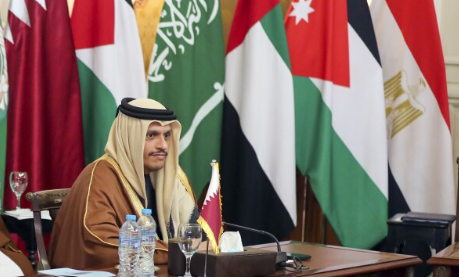Here’s a detailed 700-word article with subtopics:
Arab Leaders Dismiss Trump’s Proposal to Expel Palestinians from Gaza
Strong Regional Opposition to Displacement
Arab leaders have firmly rejected former U.S. President Donald Trump’s suggestion to relocate Palestinians from Gaza. The proposal, which implies forced displacement, has sparked widespread condemnation from Middle Eastern nations, who view it as a violation of international law and an attack on Palestinian sovereignty. The response from Arab leaders reflects a broader regional commitment to defending Palestinian rights and resisting any attempts to alter Gaza’s demographic composition.
Historical Context of Palestinian Displacement
The issue of forced displacement is deeply rooted in Palestinian history. Since the Nakba in 1948, when hundreds of thousands of Palestinians were expelled or fled their homes during the creation of Israel, displacement has remained a painful chapter in their collective memory. Similar events occurred in 1967 during the Six-Day War. Given this historical backdrop, Arab nations are particularly sensitive to any proposals suggesting the forced removal of Palestinians from their homeland.
Legal and Humanitarian Concerns
Under international law, forced displacement of a population is considered a war crime. The Geneva Conventions explicitly prohibit the transfer of civilians from occupied territories. Human rights organizations and legal experts have warned that any forced removal of Palestinians from Gaza would not only be unlawful but would also lead to severe humanitarian consequences. Already struggling with harsh living conditions due to Israel’s blockade, Palestinians in Gaza face immense hardships. Displacing them would exacerbate their suffering and create a new refugee crisis in the region.
Arab Nations’ United Stance
Leaders across the Arab world have voiced a unanimous rejection of Trump’s proposal. Countries like Egypt, Jordan, Saudi Arabia, and the United Arab Emirates have all issued strong statements opposing any attempt to expel Palestinians from Gaza. Egypt, in particular, has a vested interest in maintaining stability at its border with Gaza and has refused any plans to accept displaced Palestinians into the Sinai Peninsula. Jordan, home to a significant Palestinian refugee population, has also expressed concerns about the impact such a move would have on regional stability.
Diplomatic and Political Implications
Trump’s proposal has reignited tensions between the U.S. and Arab nations. While some Arab governments have engaged in normalization agreements with Israel in recent years, the issue of Palestinian displacement remains a red line for them. The suggestion has not only damaged U.S. relations with key allies in the Middle East but has also reinforced Arab solidarity on the Palestinian cause. Several Arab nations have intensified their diplomatic efforts to push for a ceasefire and a two-state solution, rather than allowing further displacement of Palestinians.
Impact on Palestinian Resistance and Public Sentiment
Palestinians in Gaza and the West Bank have reacted with anger and defiance to the proposal. Many see it as yet another attempt to erase their identity and rights. The idea of leaving Gaza is widely rejected, as most Palestinians prefer to remain on their land despite the challenges. Palestinian resistance groups have also denounced the proposal, vowing to continue their struggle for self-determination and statehood. The issue has further galvanized public sentiment in the Arab world, with protests erupting in several cities condemning forced displacement.
The Role of the International Community
The global response to Trump’s proposal has been mixed. While some Western countries have remained silent, international organizations, including the United Nations, have strongly opposed any forced displacement of Palestinians. The European Union has reaffirmed its commitment to a two-state solution, urging all parties to respect international law. China and Russia have also criticized any attempts to change Gaza’s demographics, calling for diplomatic solutions rather than coercion. The ongoing war in Gaza has already put immense pressure on humanitarian agencies, and forced displacement would only worsen the crisis.
Conclusion: A Dangerous and Unacceptable Proposal
Trump’s suggestion to displace Palestinians from Gaza has been met with outright rejection from Arab leaders and the broader international community. The proposal not only violates international law but also disregards the historical struggles of the Palestinian people. Instead of supporting such drastic measures, global powers should focus on achieving a lasting political solution that ensures Palestinian rights and regional stability. The firm stance of Arab nations sends a clear message: forced displacement is not an option, and the Palestinian people will not be erased from their land.
Read More: Hamas frees three Israeli hostages in swap for 183 Palestinian detainees


Leave a Comment